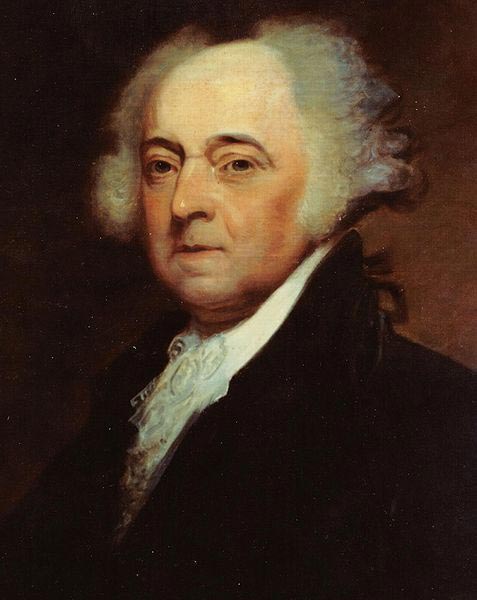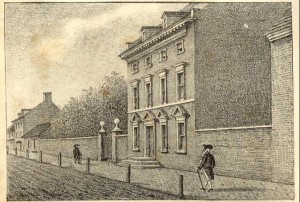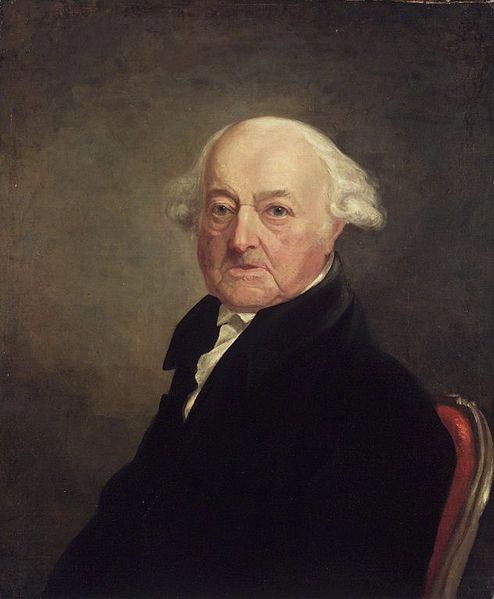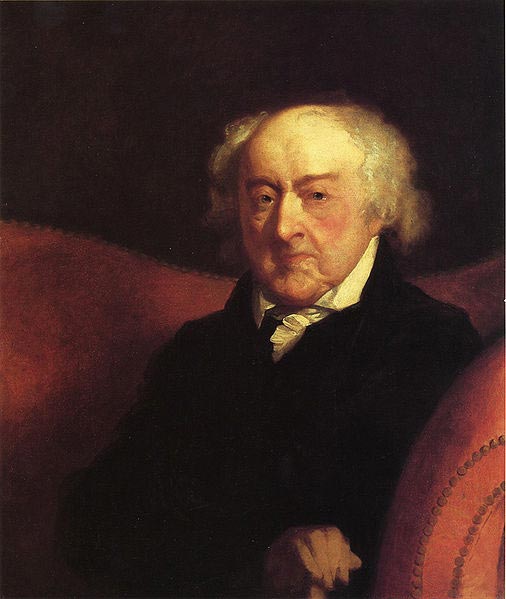| John Adams | |
|---|---|
 |
|
| 2nd United States President « Previous Next » |
|
| In office | Mar. 4, 1797 – Mar. 4, 1801 |
| V. President | Thomas Jefferson |
| Political Party | Federalist |
| Personal Info | |
| Born | Oct. 30, 1735 |
| Died | July 4, 1826 (at age 90) |
| Religion | Unitarianism |
| School | Harvard University |
| Profession | Lawyer |
| Signature | |
| Wife | Abigail Adams |
| Children | Abigail Adams Smith, John Quincy Adams, Susanna Adams, Charles Adams, Thomas Boylston Adams, Elizabeth (Stillborn) |
| U.S. Presidents 1-15 | |
| 1. George Washington (1789–1797) | |
| 2. John Adams (1797-1801) | |
| 3. Thomas Jefferson (1801-1809) | |
| 4. James Madison (1809-1817) | |
| 5. James Monroe (1817-1825) | |
| 6. John Quincy Adams (1825-1829) | |
| 7. Andrew Jackson (1829-1837) | |
| 8. Martin Van Buren (1837-1841) | |
| 9. William Henry Harrison (1841-1841) | |
| 10. John Tyler (1841-1845) | |
| 11. James Knox Polk (1845-1849) | |
| 12. Zachary Taylor (1849-1850) | |
| 13. Millard Fillmore (1850-1853) | |
| 14. Franklin Pierce (1853-1857) | |
| 15. James Buchanan (1857-1861) | |
| List of All the Presidents |
John Adams Jr. (a.k.a. “The Colossus of Independence”), a Founding Father and also the second president of the United States of America was a true American patriot with a witty, yet obnoxious personality.
Early Life of John Adams
The American statesman, diplomat, and political theorist was born on October 30, 1735 in Quincy, Massachusetts. He was a Harvard graduate at the age of sixteen in 1751. He took up the practice of law in the Office of John Putman, a popular lawyer in Worcester at that time. He was admitted to the Bar on 1758. He was popularly known as “The Rotundity” because of his weight and built.
He married Abigail Smith on October 25, 1764 and bore six children namely: Nabby, John Quincy, Susanna, Charles, Thomas and Elizabeth.
Prior to taking up law, he was a college professor at Worcester. He took that time to reflect on his career path since his father wanted him to become a minister. He actually wanted to live up to his family’s ancestry of Puritans.
Adams’ Life as a Lawyer
Even at a very young age, Adams has always been an observant and impressionist. He has recorded in his diary an impression of people that he met and events that he encountered. During his law school years, he often recorded cases and imposed upon himself to resolve and decide them. He had the passion in analyzing and expounding on things that lifted his passion.
He has several claims to fame prior to becoming the President of the United States of America. One of which is his opposition to the Stamp Act of 1765, which deals with the imposition of direct tax by the British Parliament particularly to the colonies of the British America. In his Dissertation on the Canon and Feudal Law, he stated that the Stamp Act has deprived the Englishmen of his guaranteed right to be taxed only by consent and to be tried only by a jury of one’s peers.
 His second sensational action was his representation of the soldiers accused during the “Boston Massacre of 1770”. Although he has feared about his reputation, that didn’t stop him from performing his profession as a lawyer by defending the accused soldiers. His lawyering tactics are so good that he was able to obtain an acquittal for the six of the soldiers. On the other hand, two of the soldiers who were accused of murder was convicted for manslaughter only. His intelligence and skill as a lawyer was honoured when he was elected to be a part of the Massachusetts General Court.
His second sensational action was his representation of the soldiers accused during the “Boston Massacre of 1770”. Although he has feared about his reputation, that didn’t stop him from performing his profession as a lawyer by defending the accused soldiers. His lawyering tactics are so good that he was able to obtain an acquittal for the six of the soldiers. On the other hand, two of the soldiers who were accused of murder was convicted for manslaughter only. His intelligence and skill as a lawyer was honoured when he was elected to be a part of the Massachusetts General Court.
Fighting the Parliament
He was also known as the person who fought the Parliament. It arose when Governor Thomas Hutchinson announced that he and his judges would no longer need their salaries paid by the Massachusetts legislature. He prepared a reply to the announcement through his “Two Replies of the Massachusetts House of Representatives to Governor Hutchinson, where he said that the colonies were never under the sovereignty of the Parliament. With the used of his knowledge in history, he elaborated that the colonies are connected only to Great Britain through the King and that provincial legislatures were fully sovereign on their own internal affairs. He even attacked the essay prepared by Daniel Leonard that defended the announcement made by the Governor.
Adams and Early American Politics
 Adams was sent by the Massachusetts to the Continental Congress of 1774. It was a convention of delegates called from the Thirteen Colonies, which became a governing body of the United States during the American Revolution. He was again sent by Massachusetts to the second Continental Congress in 1775-1777. During this time the resolution to declare independence was passed authored by Richard Henry Lee and was seconded by Adams. He was appointed in a committee with Thomas Jefferson, Benjamin Franklin, Robert R. Livingston, and Roger Sherman. During the attempt to adopt the Declaration of Independence, Adams was described as the pillar of support on the floor of Congress because of his undying persistence to have the Declaration of Independence adopted. Because of some hostilities regarding the declaration of independence, Adams resigned from his seat on 1777 at the Massachusetts Superior Court in order to serve as the head of the Board of Ordnance. It was during the second Continental Congress that United States of America was declared the new name of the nation.
Adams was sent by the Massachusetts to the Continental Congress of 1774. It was a convention of delegates called from the Thirteen Colonies, which became a governing body of the United States during the American Revolution. He was again sent by Massachusetts to the second Continental Congress in 1775-1777. During this time the resolution to declare independence was passed authored by Richard Henry Lee and was seconded by Adams. He was appointed in a committee with Thomas Jefferson, Benjamin Franklin, Robert R. Livingston, and Roger Sherman. During the attempt to adopt the Declaration of Independence, Adams was described as the pillar of support on the floor of Congress because of his undying persistence to have the Declaration of Independence adopted. Because of some hostilities regarding the declaration of independence, Adams resigned from his seat on 1777 at the Massachusetts Superior Court in order to serve as the head of the Board of Ordnance. It was during the second Continental Congress that United States of America was declared the new name of the nation.
There was a time when several representatives kept getting his opinion and view regarding the framing of a new government. Tired of the same questions given to him, he published the pamphlet “Thoughts on Government”. In this pamphlet he suggested to separate the executive, legislative and judicial branches of the government. It was said that this writing of Adams was very influential in the writing of the State Constitution. As a matter of fact it is often a reference in the drafting of other constitution in constitution-writing halls.
In 1777 and 1779, Congress sent Adams to Europe to represent the fledgling union. However, Adams could not speak French, making him as an unlikely representative. Consequently, his first stay in Europe was unproductive.
Before going on his second trip to Europe, Adams drafted the Massachusetts Constitution with Samuel Adams and James Bowdoin. The drafting was done between September 1 and October 30, 1779.
On his second trip, however, Adams was appointed as Minister Plenipotentiary. The purpose of which is to enter into a treaty of amity and peace with Britain. His appointment was rejected by the French government, as a result thereof, Benjamin Franklin, Thomas Jefferson and John Jay was appointed to work with Adams. During the entire negotiation, Adams focused on the right of the United States to the fisheries along the Atlantic Coast. After so many negotiations, United States were able to secure a favourable treaty by giving the U.S. ownership of all lands east of the Mississippi.
 After the negotiation in Europe, Adams was appointed as French Ambassador in Dutch Republic. He was also chosen as Ambassador for Republic of Venice and Old Swiss Confederacy.
After the negotiation in Europe, Adams was appointed as French Ambassador in Dutch Republic. He was also chosen as Ambassador for Republic of Venice and Old Swiss Confederacy.
On April 19, 1782, through his efforts and perseverance, he was able secure the recognition of the United States as an independent government at the Hague. On October 1782, Adams negotiated a treaty of amity and commerce with the Dutch Republic. This is the first treaty between the United States and foreign-power after the treaty with France in 1778.
Adams bought a house in The Netherlands, which was used as an American-owned embassy on foreign soil. In 1784 and 1785, Adams was able to forge a trade relation with Prussia.
In 1785, Adams was appointed as the first American Minister to the Court of St. James (ambassador to Great Britain). During his stint he intimated to King George III that he has no attachment but to his own country.
Vice-Presidency
When he returned from his job as Ambassador, Adams was elected Vice-President with Washington as President. While he was Vice-President, he had a month-long debate regarding the official title to be given to the President of the United States. He prefers long and elaborative titles such as, His Majesty the President or His High Mightiness. However, President of the United States won the debate. He had won two terms as Vice-President. His two terms as Vice-President was a real disappointment to him taking into consideration his intelligence, leadership skills, and vigor, which he feels was not fully utilized. He thought of the position as fully insignificant.
When he was Senate President, he was able to cast twenty-nine tie-breaking votes. Some of the votes he casts were the protection of the President’s sole authority over removal of appointees. Being witty as he is, he would sometime encourage senators to vote to legislation that he had opposed. Further, most of the time he would lecture the senators about procedures and policy matters. His time in the Senate was criticized because of conflicting political views, but towards the end his actions were restrained because of a threatened resolution.
Presidency
 Later on he joined the Federalist Party. However, he was always clashing with dominant leader Alexander Hamilton. In 1796, he was elected as the candidate for Presidency for the Federalist Party. His success was due to his seniority, intelligence, love for peace and prosperity besides the need to have a northern president. He won over Thomas Jefferson as candidate.
Later on he joined the Federalist Party. However, he was always clashing with dominant leader Alexander Hamilton. In 1796, he was elected as the candidate for Presidency for the Federalist Party. His success was due to his seniority, intelligence, love for peace and prosperity besides the need to have a northern president. He won over Thomas Jefferson as candidate.
During the election of 1796, Hamilton supported Adams despite having a grudge on him because he thought of him as the lesser evil over Thomas Pinckney. Unlike the usual campaign, Adams opted to just stay in Quincy and leave the campaigning to his supporters. His rationale to opting to stay in Quincy was to stay out of the silly and wicked game of campaigning.
His principles as President of the United States followed the values and integrity of Washington. Throughout his Presidency, he was never involved in a scandal because he followed Republican values and committed to civic virtues. He also opted to retain Washington’s cabinet, mostly to facilitate soothe transitioning. He also continued the projects and programs started by Washington during his tenure, including economic proposals. It can be concluded, therefore, that Adams did not make many changes during his Presidency.
During Adam’s tenure for Presidency, there was a serious dispute over foreign policies. Adams protected the policies crafted by Washington that he decided stay out of the war between the French and British. The French, however, saw America as the British’s junior partner, thus, it launched a “quasi-war” against America by seizing American merchant ships. Adams had sent three commissioners to settle this issue with the French, however, the French refuse to settle unless they will give a bribe. Adams was so humiliated and repulsive of the offer that he reported it to Congress and the Senate. This was the birth of the “XYZ” fever. This made Adams popular. Based on history, this was the most popular event of the Federalist Party. After a series of hostilities, France also did not approve of a war. Thus, ending the problem; Adams then sent a peace mission to France, but this brought out some rage from the Hamiltonians.
The Federalists were weakened by the death of Washington in 1799. This led to the defeat of Adams by Jefferson by 65 to 73. Taken into consideration also was the better organization by the Republicans and the disunity by the Federalist.
Adams’ Accomplishments as President of the U.S.
a. The Construction of U.S Navy Ships
b. Fought Quasi-War launched by France in 1798
c. He had signed the Alien and Sedition Act in 1798, which was intended to frighten foreign agents out of the United States.
d. Appointment of John Marshall in the Supreme Court
e. Ending the war with France through diplomacy.
What is most notable during his tenure was the fact that he just often stayed in his hometown in Massachusetts and ignored the importance of patronage and communication. However, this fact was not ignored by his opponents and was often used against him.
He was the first President who stayed in the White House and the first President whose son also became President of the United States. What is also remembered about him is his philosophy. Actually, he was considered more of a philosopher rather than a politician.
Greatest Works of Adams
One of his greatest works was the Massachusetts Constitution, which was ratified in 1780. This was written mostly by Adams himself. He structured the government according to his beliefs and views of politics. He believes in the importance of checks and balances. While he was in London, he published the work entitled “A Defence of a Constitutions of Government of the United States”. It tackled on issues of social classes, which he believes has to be accepted by the government.
Adams never hired a slave. He was against slavery. In fact he made a speech in 1777 against a bill to emancipate slaves in Massachusetts. Slavery was actually forbidden because of the Declaration of Rights that Adams included in the Massachusetts Constitution.
John Adams Jr. retired on his farmland in Quincy, Massachusetts. He spent some of his time there writing elaborate letters to Thomas Jefferson.